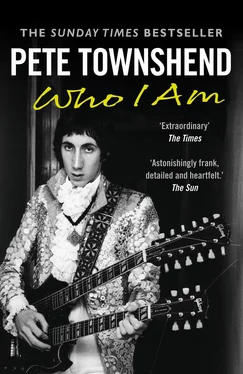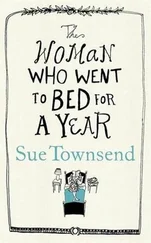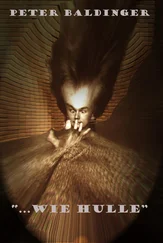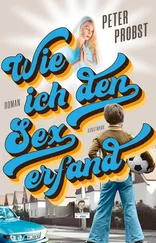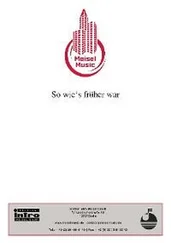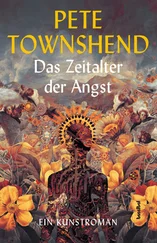Horry met Grandma Dorothy in 1908. They worked together as entertainers and married two years later, when Dot was eight months pregnant with their first child, Jack. As an infant, Uncle Jack remembered his parents busking on Brighton Pier while little Jack watched nearby. A grand lady walked up, admired their efforts and threw a shilling into their hat. ‘For which good cause are you collecting?’ she asked.
‘For ourselves,’ Dot said.
Dot was striking and elegant. A singer and dancer who could read music, she performed at concert parties, sometimes alongside her husband, and later contributed to Horry’s songwriting. She was cheerful and positive, though rather vain and a bit of a snob. Between performances Horry and Dot conceived my father, Clifford Blandford Townshend, who was born in 1917, a companion for his older brother Jack.
Mum’s parents, Denny and Maurice, lived in Paddington during Mum’s early childhood. Though obsessive about cleanliness, Denny was not a careful guardian. Mum remembers hanging out the upstairs window with her baby brother, Maurice, Jr, waving at her father driving past on his milk float. The little boy nearly slipped out.
Granddad Maurice was a sweet man who was cruelly jilted when Denny – after eleven years of marriage – abruptly ran off with a wealthy man, who kept her as his mistress. On that day Mum came home from school to an empty house. Denny had taken all the furniture except for a bed, leaving only a note with no address. It took Maurice several years to track the wayward woman down, but they were never reconciled.
Maurice and the two children moved in with his mother, Ellen. Mum, just ten, contributed to running the house, and fell directly under her Irish grandmother’s influence. Mum was ashamed of the mother who had abandoned her, but proud of her grandmother Ellen, who taught her to modulate her speaking voice to round out the Irish in it. Mum became adept at mimicking various accents, and showed an early aptitude for music.
Eventually, as a teenager, Mum moved in with her maternal Aunt Rose in North London. I remember Rose as an extraordinary woman, self-assured, intelligent, well read; she was a lesbian, living quietly but openly with her partner.
Like me, Dad was a teenage rebel. Before the war he and his best friend were members of Oswald Mosley’s fascist Blackshirts. He was ashamed of this later, of course, but forgave himself – they were young, and the uniforms were glamorous. Instead of staying with Prokofiev’s clarinet studies, through which he’d brilliantly stormed for two hours every morning, Dad at sixteen chose to play at bottle parties, an English variant on the speakeasy. The musicianship required of him at these gigs demanded little of his skill. Throughout his life he was over-qualified, technically, for the music he played.
Within a few years Dad was performing around London with Billy Wiltshire and his Piccadilly Band, playing music for dancing or lounging at bars – ‘bar-stooling’, as it was known. In the interval between two world wars, sophistication, glamour and light-heartedness obscured an underlying fear of extinction. The big issues were hidden in clouds of cigarette smoke and innovative popular music. Sex was, as ever, the ingredient that would calm the anxious heart. Yet in the music of my father’s era, sexual energy was implied rather than displayed, hidden behind the cultivated elegance of men and women in evening dress.
War and music brought my parents together. Dad enlisted in the RAF in 1940 and played saxophone and clarinet in small bands to entertain his colleagues as part of his duties. By 1945 he was playing in the RAF Dance Orchestra, one of the largest in any of the services. Recruited from enlisted men who had been members of well-known bands and directed by Sergeant Leslie Douglas, it has been described as the greatest dance orchestra Britain ever produced. It was, in its own way, revolutionary. Its secret weapon was Swing, still not generally acceptable to society at large, but the common people loved it. Dad had secured the job because Vera Lynn’s husband, saxophonist Harry Lewis, although in the RAF, was afraid of flying and didn’t want to fly to Germany. And in fact when the motorcycle messenger shouted out the news of my birth from the footlights, Dad was away in Germany, playing saxophone for the troops.
Mum falsified her age to enlist in 1941. A gifted singer, she became a vocalist in Dad’s band. A concert programme for 18 June 1944 at Colston Hall, Bristol, lists her singing ‘Star Eyes’, ‘All My Life’ (a duet with the handsome Sergeant Douglas) and ‘Do I Worry’. Dad is featured as the soloist on ‘Clarinet Rhapsody’ and ‘Hot and Anxious’. According to a sleeve note, the RAF Dance Orchestra directed the ear of the public. ‘From slush to music with a beat, the rhythm had flexibility, the soloist more room for expression.’
When the war ended the band chose to go by its popular name: the Squadronaires.
According to Mum, the early years of her marriage were lonely. ‘I never saw Dad. He was never there. And when he was, he was over the road in the bloody White Lion or up at the Granville.’ Cheerful, good-looking and quick to buy a round at the bar, Dad was popular in the local pubs, where his musical success made him a bit of a celebrity.
Mum’s loneliness may help explain why she was so angry with my father for being absent at my birth. Mum, who had been living with Dad’s parents, showed her resentment by moving out. She knew a Jewish couple, Sammy and Leah Sharp, musicians from Australia, who lived with their son in one big room, and Mum and I moved in with them. Leah took me over. I don’t remember her, but Mum described her as ‘one of these people who loved to do all the bathing and pram-pushing and all that lark’. Mum, less interested in ‘all that lark’ – and still working as a singer – was grateful for the help.
In 1946 my parents reconciled, and the three of us moved to a house in Whitehall Gardens, Acton. Our next-door neighbours included the great blind jazz pianist George Shearing and the cartoonist Alex Graham, whose studio, with its adjustable draughting board, huge sheets of paper, inks and complicated pens, fascinated me, and planted the seeds that later inspired me to go to art college.
We shared our house with the Cass family, who lived upstairs and, like many of my parents’ closest friends, were Jewish. I remember noisy, joyous Passovers with a lot of Gefilte fish, chopped liver and the aroma of slow-roasting brisket. Each family had three rooms, a kitchen and a bathroom, but no inside toilet. Ours was in the back yard, and our toilet paper was a few squares of newspaper hung on a nail. Between the cold and the spiders, my trips there never lasted long.
I slept in the dining room. My parents seemed to have little sense of the need to provide me with a place of my own, where I could leave my toys or drawings out without feeling I was encroaching on adult territory. I had no sense of privacy, or even any awareness that I deserved it.
Mum gave up singing and later regretted it, but she always worked. She helped run the Squadronaires from their office in Piccadilly Circus, and often took me on the tour bus, where I basked in the easygoing attitude of the band and looked after the empty beer bottles. Our road trips always ended at a small seaside hotel, a holiday camp or an ornate theatre full of secret stairways and underground corridors.
Charlie, who managed the road crew, was the butt of numerous practical jokes, but the Squadronaires clearly loved him. The impact of Mum and Dad’s daily influence on me waned a little in the presence of the band, which was like a travelling boys’ club. Mum was the singing doll in residence, and Dad’s musicianship gave him a special status among his peers. Dad always worked for at least an hour on scales and arpeggios, and his morning practice seemed magical in its complexity. In rock today we use simpler language: he was fast .
Читать дальше
